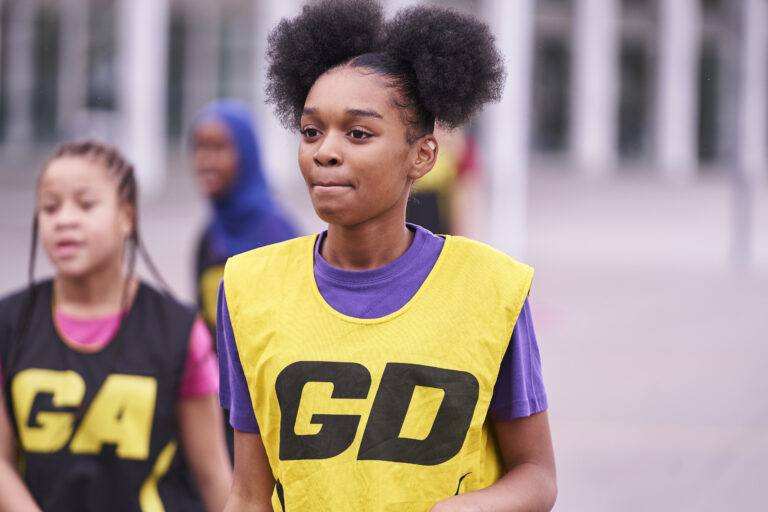London Sport’s Active LDN conference took place on 17 October at Decathlon to discuss “Active Solutions to London Challenges”. A few weeks on from the event, our Senior Insight Officer, Megan Bevis reflects on one of the event sessions: “Innovative Solutions for Engaging Teenage Girls”.
Across London we know that only 4 in 10 girls are active, meeting the Chief Medical Officer’s guidelines of least 60 minutes per day across the week. We also know that this has been the case for many, many years. Girls are consistently less active than boys (Active Lives CYP (londonsport.org), except during the Covid-19 pandemic, when we saw girls’ activity levels actually increase. When looking at the data in more depth, for girls, and teenage girls specifically, it’s likely that the choice of activities during the pandemic suited them better, for example walking and fitness activities at home.
Unfortunately, since the pandemic, we have seen the activity gap return. This got us thinking about how we can learn lessons from the changes to exercise behaviour since the pandemic and the potential opportunities for support to close the activity gap. You can learn more about London Sport’s ‘Activating Space for Girls’ project towards the end of this article, and you can see London Sport’s Manifesto, which includes policy asks of the next Mayor of London to create environments that ensure women’s safety.
At Active LDN 2023, London Sport and some of our partner organisations (Women In Sport, Access Sport, Black Prince Trust, and London Youth) shared some of the innovative solutions they have developed to engage teenage girls in sport and physical activity. From new inclusive methods to engage with girls, to providing activities in a range of different and non-traditional spaces, or incorporating exercise with other activities, here are the panel’s top recommendations to engage teenage girls in physical activity:
Key takeout’s
Meet girls where they are at
Understand what teenage girls want and need by asking them – understand their barriers, find out what they want to do, and how they physical activity could fit into their lives. Between school, revision, caring for family members, and maintaining a social life, teenage girls have a lot of commitments and balancing these is hard. Consider engaging girls within the spaces they already “hang out” in.
Trust and safety are key
Girls want a safe space to exercise and also not be worried about fear of judgement, for example being with people who are “better” or “fitter” than them. Diana Voynova from the Black Prince Trust explained how they supported their coaches to discuss teenage girls’ expectations of the sessions. They also created a space where girls feel comfortable to open up and discuss issues that are affecting them.
Also consider how you can adapt the spaces to make girls feel comfortable to exercise, for example, blocking windows, having female-only staff, or closing off the space to anyone who isn’t your target audience.
Don’t always lead with physical activity
Physical activity won’t always be the draw to entice people in. Rebekah Keane from London Youth explained how they provided creative and physical activity sessions to support teenage girls’ mental health. Having the ability to choose what they do in sessions is really important to girls whether this is different physical activities or having an area to hangout, and spaces should be flexible to adapt to the girls’ mood and energy levels.
Also consider using food within sessions – not just refreshments but a meal – to “break bread” and encourage meaningful connection.
Be youth-led throughout
From the ideating through to developing sessions to delivery, have an open communication with girls to ensure sessions are co-developed and an activity that they want to do in an environment they feel comfortable in. Don’t make assumptions about what girls want – look at existing research and/or conduct your own.
Make it fun
Focus your activities with a sense of play rather than a sense of sport – if people have fun doing something, they are more likely to want to continue. Also consider how you can build in socialising time within and around the sessions.
Further information and resources
London Sport
To understand more about the lives of teenage girls in London, we ran eight focus groups in five locations across London for girls aged 11 to 19 to share their thoughts on how to overcome barriers to activity. Space for Girls (londonsport.org)
Women In Sport
In 2022, Women In Sport published their latest research (Reframing Sport for Teenage Girls: Tackling Teenage Disengagement – Women in Sport) understanding teenage girls attitudes to physical activity. Following this, they developed their ‘Big Sister’ project which was by girls, for girls, to support teenage girls to enjoy sport, exercise and physical activity during puberty. The project helped more than 3,000 teenage girls to get active, by offering free gym memberships and period products, as well as tailored workout sessions and advice.
Access Sport
Access Sport are collaborating with Women in Sport, Nuffield Health and The Sweaty Betty Foundation to support disabled girls to be more active. By refocusing the language used in their research methods to be more inclusive, they hope to reflect the reality that teenage girls are not a homogenous group and often the unique experiences of disabled teenage girls can be lost when viewed through research focused solely on girls or disabled young people. (Access Sport Launches Research Into Disabled Teenage Girls | Access Sport)
Black Prince Trust
In Lambeth, the Black Prince Trust’s ‘Born to move’ programme was designed to provide young females with more opportunities to get back into physical activity through weekly sessions and help participants learn new skills to be able to workout at home. As part of the program, participants who attended 3 or more sessions were gifted free equipment packs consisting of 2kg dumbbells, skipping ropes, yoga mats, resistance bands, gym bags, leggings, and sports bras. In addition, participants were also provided with free access to Les Mills online content to help shape and inspire their home workouts.
London Youth
London Youth’s ‘Good for Girls’ project combined creative and sporting activities to support and improve teenage girls mental wellbeing and challenge stigma. Alongside the activities, they discussed emotional wellbeing and issues they care about, as well upskilling girls in leadership programmes to promote wellbeing in their communities.

